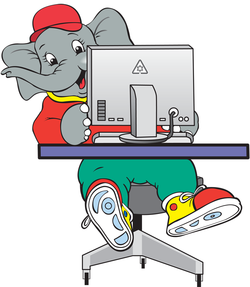
Cyber Safety Starts Young & Online Safety Rules
Cyber Safety Starts Young & Online Safety Rules
Children get hooked on computers at an early age which is why the Canada Safety Council featured the theme of “Cyber Safety Starts Young” for the National Community Safety and Crime Prevention Campaign last November. According to Young Canadians in a Wired World, an astonishing 94 percent of young people access the Internet from home. Parents need to know that just because children have the ability to surf and handle a mouse, does not give them the ability of critical thinking or the capacity to scrutinize content and filter fake from reality.
Here are some basic cyber safety tips
For parents of children aged 5 – 7 years old:
- Always sit with them when they go online and limit access by book-marking some parent-approuved sites. Chat rooms, instant messaging and message boards are not age-appropriate.
- Start teaching privacy issues and teach them to never give out personal information. (See Elmer’s Web Safety Poem)
- Encourage them to tell you about anything that they come across that is disturbing or makes them feel uncomfortable. Remember to stay calm and let them know that they did the right thing in coming to see you.
For parents of children aged 8 – 10 years old:
- Keep the family computer in an area that is easy to monitor. Talk to your children about good values and possible hazards associated with computer use.
- Create “Family Internet Rules” with the input of your children. This should include a list of sites that are approuved, permission being granted when any information is given out and perhaps the length of time spent at the computer.
- Do your homework and find some reputable clubs or chat rooms. Help contribute to a computer experience that is free of undesirable cyber intrusions.
For parents of children aged 11 and up:
- Computer-use will mushroom into multiple social networks and countless bookmarked sites, parents must acquire a new vigilance and approach in dealing with cyber hazards.
- Take time to familiarize yourself with your teen’s computer interests. A regular exchange will help keep the lines of communication open.
- CSC’s best advice to parents is that since computers are here to stay, parents should start young and instill good and safe habits with the Internet. Develop and nurture a relationship of trust and exchange and show interest in your children’s cyber life.
The Canada Safety Council recommends that children who use the Internet follow these Online Safety Rules:
- I will not give out any personal information online without my parents' permission. This includes my name, phone number, address, e-mail, location of my school, my parents' work address/ telephone numbers and credit card numbers, and my picture. This goes for anywhere on the Internet, including e-mail, chat rooms, newsgroups – even Web sites that promise me free stuff or prizes, or on Web pages that I make myself.
- When using the Internet, I will always use a pretend name or nickname that doesn't reveal whether I'm a boy or a girl.
- When creating a password, I will make one up that is hard to guess but easy for me to remember. To avoid having it stolen, I will never reveal it to anyone (except my parents) – not even my best friend.
- I will not respond to any message that makes me uncomfortable. I will show an adult right away.
- I will arrange to meet a friend I have made on the Internet ONLY if one of my parents has been informed and will be present.
- I will not send an insulting or rude message to anyone online. This is called "flaming" and it is not good Netiquette.
- I will not disable any filtering software my parents have put on the computer.
- I will not open e-mail, files, links, pictures or games from people that I don't know or trust. I will always ask an adult first.
- I will not take words, pictures or sounds from someone else's Web site without their permission.
- I will not believe everything I read on the Internet. I will always check the source of the information and confirm it with my teacher, parent or librarian.
Source: Canada Safety Council www.safety-council.org


